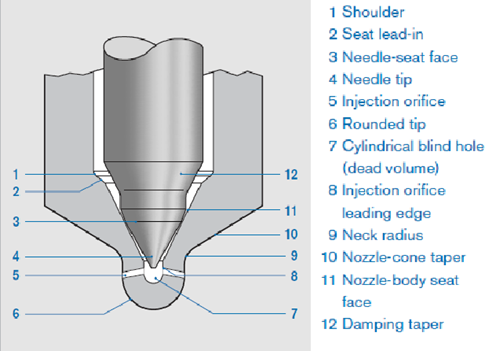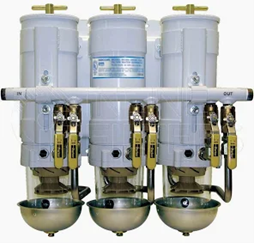The importance of clean dry fuel
90% of all generator shutdown faults during running are due to blocked or partially blocked filters, insufficient fuel is supplied to the engine, this causes the engine to slow and drop below the 1500RPM rate.
The generator shuts down under speed. Sediment in the main tank can be disturbed during a fuel refill during an extended power outage. This can have a catastrophic effect on the filters and will lead to blackout.
The current standard for measuring particulate in oils is the standard from ISO 4406:1999 but can be a little difficult to understand. So here is our attempt to simplify it for you:
Essentially ISO 4406:1999 represents a standardised method of counting and reporting the number of particles of contamination found in an oil. The most common method of counting particles today is to pump the oil past a fine laser beam. The laser looks for particles that are 4µm, 6µm & 14µm (4,6 & 14 microns) and generates a total number of particles over a set time for each size. This can then be referenced back to the ISO Standard Table as shown below to produce a Cleanliness Code. Lower the numbers in the code represents fewer particles in the oil. Examples of codes and their corresponding applications are:
__________________________________________________________________
For example: The industry standard code for diesel used in engines is 18/16/13.
- 18 = More than 1300 and up to 2500 particles larger than 4µm exist in the sample.
- 16 = More than 320 and up to 640 particles larger than 6µm exist in the sample.
- 13 = More than 40 and up to 80 particles larger than 14µm exist in the sample.
Number of Particles per mL Typical Applications
4µm 6µm 14µm
14 12 9 High precision & laboratory servos
17 15 11 Robotic & servo systems
18 16 13 Very sensitive & high reliability systems
20 18 14 Sensitive & reliable systems
21 19 16 General equipment of limited reliability
23 21 18 Low pressure equipment – not much use
Poor-quality diesel fuel can lead to a decline in engine performance, characterized by reduced power output, increased fuel consumption, and higher exhaust emissions. Monitoring fuel consumption, power output, and emission levels is crucial in identifying and addressing these issues.
Continued use of poor-quality diesel not only affects immediate performance but can also lead to long-term engine damage. This includes increased wear and tear on engine components due to inefficient combustion and potentially higher levels of corrosive substances in the fuel. Consequently, maintaining vigilance over fuel quality is not just about preserving current engine performance but also about safeguarding the engine’s overall health and longevity. Regular fuel quality checks and adherence to recommended fuel standards are key to preventing these issues.
Fuel filters become clogged over time, and while the engine may not show signs of blocked filters during normal test runs without load on the generator, when load is applied, the engine may struggle to receive enough fuel to maintain 1500 RPM and therefore unable to maintain 50Hz frequency and shutdown.
Blocked fuel filters during a power outage can cause problems. The engine must be shut down to change the filters, and therefore no electricity is generated, and we have a blackout situation. It is wise to remove all particulate matter prior to the fuel reaching the engine fuel filter by using fuel polishing.
It may also be practical to fit filters prior to the engine filters that can be changed without the need to shut down the engine.
Poor-quality diesel fuel can lead to blocked filters, a significant issue affecting the performance and maintenance of diesel engines. This blockage primarily results from contaminants and impurities.
- Particulate Contamination: Diesel fuel can contain particulate matter like dust, dirt, and rust. These particles can clog the fuel filter, impeding fuel flow. The size and concentration of these particulates are critical. Filters are designed to trap particles larger than a specific size, often measured in microns. Modern diesel engines typically require fuel with particulate contamination less than ISO 4406 18/16/13 to prevent filter blockage.
- Water Content: Water in diesel, often measured in parts per million (ppm), can cause filter blockage by promoting microbial growth, which forms biomass that clogs filters. The water content in diesel should be below 200 ppm to minimize the risk of microbial growth and subsequent filter clogging.
- Fuel Stability: Oxidation and thermal breakdown of diesel fuel can create insoluble gums and varnishes that can block filters. This breakdown can be accelerated by high temperatures and prolonged storage.
- Biodiesel Blend Quality: Biodiesel blends, particularly those higher than B20 (20% biodiesel, 80% petroleum diesel), can contribute to filter clogging due to higher levels of contaminants and the tendency of some biodiesel to form precipitates at lower temperatures. Biodiesel content and quality should be monitored to ensure compliance with engine manufacturer specifications.
- Sulphur Content: Although less common with ultra-low sulphur diesels (ULSD), high sulphur content can contribute to deposits and clogging in filters. ULSD typically contains sulphur at levels not exceeding 15 ppm.
- Filter Micron Rating: The micron rating of a diesel fuel filter (the size of the smallest particle it can effectively capture) is crucial. Most modern diesel engines use filters with a rating of around 10 microns. Understanding the filter’s micron rating helps in diagnosing if the diesel quality is responsible for the blockage.
- Filter Differential Pressure: Monitoring the differential pressure across the fuel filter can indicate a blockage. A significant increase in this pressure difference suggests that the filter is clogged and needs attention. Regular maintenance, including fuel filter checks and replacements, along with using high-quality diesel, are essential practices to prevent issues like filter blockage, ensuring smooth engine operation and longevity.Poor-quality diesel fuel can lead to blocked fuel injectors, a critical issue that affects engine performance and efficiency. This blockage is typically a result of contaminants present in the diesel, which can be analysed and quantified using various technical parameters and numbers. Particulate Contamination Level: Fuel injectors can become blocked by particulates present in diesel. These particulates are often measured in microns. Diesel fuel should have an ISO4406 of 18/16/13 of particulate matter to avoid injector blockage. High precision fuel filtration systems are designed to remove particles larger than 1 microns to protect the injectors.
Cetane Number: Although cetane number primarily affects combustion quality, very low cetane numbers (below 40) can cause incomplete combustion, leading to residue that can block injectors. A cetane number of 45-55 is generally considered optimal for modern diesel engines.
Sulphur Content: High sulphur content in diesel, above 10-15 parts per million (ppm), can lead to the formation of sulfuric acid in the combustion process. This acid can create deposits that block fuel injectors.
Water Content: Water in diesel fuel, measured in ppm, can lead to rust and corrosion within the fuel system, including injectors. Water content in diesel should be below 200 ppm to prevent such issues.
Biodiesel Content: Biodiesel blends higher than B20 (20% biodiesel, 80% petroleum diesel) can increase the risk of injector clogging due to higher viscosity and potential for increased microbial growth in the fuel, which forms sludge and blocks injectors.
| Category | Symptom | Description and Technical Concepts |
| Visible and Audible Signs | Excessive Smoke Emissions: Black Smoke | Indicates incomplete combustion due to high carbon content. Low cetane number (below 40) contributes to this. |
| Excessive Smoke Emissions: Blue Smoke | Suggests oil burning, potentially due to fuel contamination. | |
| Excessive Smoke Emissions: White Smoke | Sign of unburnt fuel, often from low fuel temperatures or water contamination. | |
| Performance-Related Symptoms | Reduced Engine Power and Efficiency | Results from low calorific value (less energy per liter) and incomplete combustion. |
| Increased Fuel Consumption | Higher consumption due to lower energy content in the fuel, measured in Megajoules per litre (MJ/L). | |
| Mechanical and Operational Issues | Difficulty in Starting the Engine | Caused by high pour point, the temperature below which fuel loses fluidity, especially in cold environments. |
| Frequent Fuel Filter Clogging | Due to particulate contamination and water in the fuel, leading to blockages. | |
| Long-Term Engine Health Concerns | Corrosion and Damage to Fuel System Components | From acidic compounds and high sulphur levels (above 10-15 ppm). |
| Increased Engine Wear and Tear | Due to poor lubricity in diesel, measured by the High Frequency Reciprocating Rig (HFRR) test with ideal wear scar diameters less than 460 microns. |
Permanent fuel polishing and water separation with the addition of magnetic particle separation on the bulk tank ensures stored fuel is maintained in optimum condition for use by engines.
The Racor Marine Fuel Filter Water Separator Turbine Series is the most trusted fuel litre water separator on the market. The UL-approved assembly features a three-stage filtration system that effectively removes water and particulates from fuel, providing maximum protection of diesel engine components in marine applications where reliability is critical.
______________________________________
Fuel Storage Solutions Limited is a private family-owned and managed business. Co-Directors Jonathan and Katharine Barnett launched FSS in 2002. Today we are one of the UK’s leading and most well-respected fuel system solutions providers, employing 40 people nationwide.
We service a wide range of market sectors including leading Facilities Management Companies.
| OFTEC registered Fuel Specialists | Recipient of THE KING’S AWARD FOR ENTERPRISE |
If we can help you with any service related to the use and storage of fuel call our specialist CATS team on 01274 813003.
Your Fuel Specialists



 01274 813 003
01274 813 003 sales@fuelstoragesolutions.co.uk
sales@fuelstoragesolutions.co.uk Back to Blog
Back to Blog 




 01274 813 003
01274 813 003 sales@fuelstoragesolutions.co.uk
sales@fuelstoragesolutions.co.uk